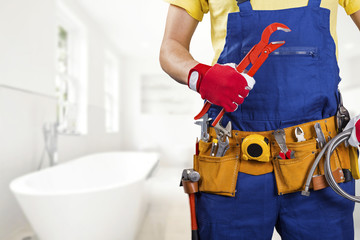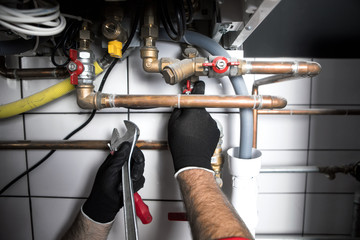Plumbers Near Me Prices play a vital role in maintaining the functionality of water and drainage systems. Their expertise ensures that homes and buildings have a steady supply of clean water and efficient waste removal.

Plumbing issues can disrupt daily life, making quick and effective solutions essential. Professional plumbers handle everything from minor leaks to complex installations.
Plumbing systems are complex networks of pipes, valves, and fixtures. Skilled plumbers understand how to navigate these systems to diagnose and repair problems. They assess the condition of the pipes and fittings to determine the best course of action. Their ability to troubleshoot issues prevents long-term damage.
Leaks are one of the most common plumbing problems. Even a small leak can lead to significant water damage over time. Plumbers use advanced tools to locate hidden leaks within walls or under floors. Early detection and repair prevent costly structural damage.
Drain blockages can cause slow water drainage and unpleasant odors. Plumbers use specialized equipment to clear clogged pipes and restore proper flow. High-pressure water jets and drain snakes are effective tools for this task. Professional cleaning ensures that blockages do not return quickly.
Plumbers also handle the installation of new fixtures and appliances. Sinks, faucets, showers, and toilets require precise connections to the plumbing system. Incorrect installation can lead to leaks or poor water pressure. Professional plumbers guarantee secure and leak-free connections.
Water heaters are another area of expertise for plumbers. They install and repair different types of water heating systems. Faulty heaters can cause inconsistent water temperatures or complete loss of hot water. Plumbers ensure that the heating system functions safely and efficiently.
Plumbers address issues related to low water pressure. Blocked pipes, faulty valves, or sediment buildup can restrict water flow. They identify the cause and restore normal pressure levels. Consistent water pressure improves the performance of showers, faucets, and appliances.
Frozen pipes are a common problem in colder weather. When water freezes, it expands and can cause pipes to burst. Plumbers use heat and insulation techniques to prevent freezing. Prompt action prevents water damage and costly repairs.
Plumbers also work on sewer line issues. A damaged or blocked sewer line can cause backups and foul odors. Plumbers use cameras to inspect the sewer line and identify the problem. They repair or replace damaged sections to restore proper drainage.
Gas line installation and repair are specialized services provided by some plumbers. Gas leaks pose serious safety risks and require immediate attention. Plumbers use pressure testing and leak detection tools to secure gas lines. Proper installation prevents the risk of fire or explosions.
Plumbing maintenance is essential for preventing future problems. Routine inspections help identify minor issues before they escalate. Plumbers check for signs of corrosion, leaks, and wear in the system. Preventive maintenance extends the lifespan of the plumbing network.
Plumbers also handle backflow prevention. Backflow occurs when contaminated water reverses into the clean water supply. Specialized valves prevent this from happening. Plumbers install and maintain these systems to ensure water quality.
Rainwater drainage systems are part of a plumber’s expertise. Proper drainage prevents flooding and water pooling around the foundation. Plumbers design and install gutter and downspout systems to direct water away from the structure. This protects the foundation and landscaping from water damage.
Plumbers are trained to work with both residential and commercial plumbing systems. Commercial systems often involve higher water pressure and complex pipe layouts. Plumbers adapt their techniques to handle the increased demand. Their versatility allows them to manage different types of systems.
Emergency plumbing services are critical when unexpected issues arise. Burst pipes, overflowing toilets, and major leaks require immediate attention. Plumbers respond quickly to minimize water damage and restore functionality. Their prompt service prevents further damage to the property.
Plumbers use advanced technology to improve service quality. Thermal imaging detects hidden leaks behind walls. Acoustic listening devices identify the sound of water escaping from pipes. These tools allow for precise and non-invasive problem detection.
Water filtration and purification systems are also part of plumbing work. Plumbers install and maintain systems that remove contaminants from the water supply. Clean and safe water improves health and taste. Regular maintenance ensures the system functions properly.
Smart plumbing technology is becoming more common. Leak detection sensors and automatic shutoff valves provide added protection. Plumbers install and program these systems to respond to leaks and pressure changes. Smart technology enhances the efficiency and safety of plumbing systems.
Plumbers also specialize in greywater recycling systems. Greywater from sinks, showers, and washing machines can be reused for irrigation. Plumbers design and install systems that filter and distribute greywater safely. This reduces water waste and lowers utility costs.
Water softening systems address hard water problems. High mineral content in water can cause buildup in pipes and appliances. Plumbers install softeners that remove calcium and magnesium from the water. Softened water extends the lifespan of plumbing fixtures and improves water quality.
Plumbers often work with construction teams during new building projects. They design and install complete plumbing systems based on the building’s layout. Careful planning ensures proper water flow and drainage. Professional installation prevents future issues.
Plumbers also handle retrofitting projects. Upgrading old plumbing systems improves efficiency and reduces water waste. Modern materials such as PEX and copper offer improved durability. Retrofitting extends the life of the plumbing network and improves performance.
Plumbers receive specialized training and certification. They stay updated on building codes and safety standards. Compliance with regulations ensures that plumbing systems meet legal requirements. Professional training ensures high-quality workmanship.
Plumbers are skilled in working with different pipe materials. Copper, PVC, and galvanized steel each have unique properties. Plumbers select the best material for each application. Proper material choice ensures durability and compatibility.
Water conservation is a growing focus in plumbing work. Plumbers install low-flow fixtures and dual-flush toilets to reduce water consumption. Water-saving solutions lower utility bills and benefit the environment. Efficient systems maintain strong performance while using less water.
Plumbers also handle irrigation system installation and repair. Proper irrigation ensures even watering of lawns and gardens. Timed systems and moisture sensors improve water efficiency. Plumbers design and adjust systems to suit specific landscapes.
Plumbing emergencies can lead to extensive property damage if not addressed quickly. Plumbers are trained to respond to urgent situations with precision. They shut off water sources, repair leaks, and restore normal operation. Quick response limits the extent of damage and reduces repair costs.
Plumbers also work with HVAC systems connected to water lines. Heating and cooling systems rely on water for proper function. Plumbers ensure that water connections are secure and free of leaks. Proper maintenance prevents system failure and extends equipment life.
Plumbers contribute to sustainable building practices. They install rainwater collection and greywater recycling systems. Efficient plumbing designs reduce water waste and promote conservation. Sustainable practices benefit both the environment and homeowners.
Plumbers often work in confined and challenging spaces. Crawl spaces, basements, and utility rooms require careful maneuvering. Plumbers use specialized tools to work effectively in tight areas. Their adaptability ensures high-quality results in any environment.
Plumbers provide valuable advice to homeowners. They recommend maintenance schedules and water-saving solutions. Educating homeowners helps prevent future problems. Informed decisions improve the efficiency and longevity of the plumbing system.
Plumbers also handle complex remodeling projects. Moving sinks, showers, and pipes requires careful planning. Plumbers adjust the layout to match the new design. Professional work ensures that the remodeled space functions properly.
Plumbers remain essential for maintaining water and drainage systems. Their expertise ensures reliable water supply and waste removal. Professional service prevents damage and maintains system efficiency. Investing in skilled plumbing work improves the comfort and value of a property.



